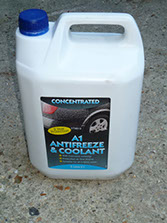 Grumpy, me? Well for once, today I almost smiled, and others who happened to be in my workshop at the time were seen to be concealing grins (at the very least). Please agree that you won’t smile, nor laugh, nor titter, when you read this – and I promise that this story is true.
Grumpy, me? Well for once, today I almost smiled, and others who happened to be in my workshop at the time were seen to be concealing grins (at the very least). Please agree that you won’t smile, nor laugh, nor titter, when you read this – and I promise that this story is true.
Recently a new customer had brought his car to me for a pre-MoT check and service, which I duly started to carry out. Halfway through the day, the chap popped in to enquire when he might be able to collect his vehicle, and at the time I was just assessing the condition of the coolant in his engine. I pointed out to him that, according to my anti-freeze tester, the cooling system seemed to contain just water, with no evidence whatsoever of the presence of anti-freeze.

“Yes, that’s right”, he confirmed. Slightly taken aback, I pointed out that over a number of days, overnight temperatures had been dropping to well below freezing point, and that his engine’s cylinder block and head were at risk of severe frost damage. I have often seen the results of frozen coolant through having insufficient (or no) anti-freeze in the system; typically the engine’s core plugs can be forced out under huge pressure as the water turns to ice and expands, or the water pump (for example) can be driven out of the cylinder block on its studs, on a ‘pillar’ of ice, or the block or head can even split, such is the degree of pressure involved.
“Ah yes”, said our customer, “I’m aware of the problem, but I don’t believe in spending cash unnecessarily on anti-freeze. So during very cold weather I get up during the night and run the engine for a while to warm it up. When it’s really cold I do this two or three times each night, so that the engine never gets cold”.
I was utterly amazed, and almost speechless. Gathering my wits and desperately trying to find some sensible words to utter, I think I managed to explain to this gent that high quality anti-freeze is a good investment in many ways. Not only does it prevent the coolant from freezing, but it also contains corrosion inhibitors, to help prevent internal corrosion within the cooling system (aluminium cylinder heads and blocks are especially vulnerable to corrosion/erosion from within). In addition, a quality anti-freeze also acts as a ‘summer coolant’ during the hotter months of the year, usefully raising the boiling point of the coolant and helping to prevent engine damage.
Eventually he agreed to let me flush his car’s cooling system and to re-fill it with fresh anti-freeze mixture. Certainly this cost a few pounds but his engine is now better protected for all year round use, and to my mind using anti-freeze sure beats setting an alarm every few hours to go and start your car’s engine in the dead of a winter’s night!